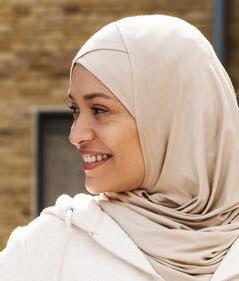






















Uniquely structured to fill a gap in Islamic Studies offerings in Canada, CIC’s intended programs bring both vision and objective that are not currently present in Canadian higher learning institutions.
CIC’s Honours Bachelor of Arts in Islamic Studies was designed to meet the highest standards of postsecondary education programs. The program is constructed around 3 main parts:

The academic program will culminate in an Honours Bachelor of Arts in Islamic Studies with an option to choose from 5 areas of specialization.
The B.A. (Honours) in Islamic Studies has carefully benchmarked its program against other universities all over the world. Beyond Canada, the countries chosen for this survey are: UK, France, Germany, US, Malaysia, Turkey and Australia. Our CIC program contains many core components common to other programs.
This rigorous core program is designed to provide our students with solid knowledge related to the primary sources of Islamic Studies such as the Qurʾan, the Sunnah of the Prophet, Islamic Thought, Islamic Objectives (Maqasid), Islamic sociology, Islamic Political Theory, Islamic Philosophy, Muslim Civilization and Sciences, as well as Islamic Arts.
All students must successfully complete a practicum placement – normally in the summer semester between years 3 and 4 – which carries a 15-credit equivalent (200 hours)
This internship placement provides students with opportunities to network within their respective industry and to evaluate potential career opportunities in the field of Islamic Studies in general or the specialization in which the student is enrolled in. The internship assists students in developing professional skills, gaining hands-on experience.
Students will have to conduct high-level research in Islamic Studies. This Capstone Project will be conducted in the fourth year of study.

In addition to the Core Curriculum, the program is complemented with courses designed to help students broaden their knowledge in the liberal arts and enhance their capacity to synthesize and rebut critiques from an Islamic perspective. It aims to empower students with the ability to think critically, write, research, and engage with their peers and community in a meaningful and substantive manner.
The Specialization Program deepens and broadens the Core Program and enables our students to focus their studies in one of the 5 specializations.
At the heart of each of the 5 specialization areas of concentration lies the fundamental principle of translating faith into action. The Specialization Program includes 24-30 credits specific to each of the five specializations. These courses are built within a framework of understanding Islam that emphasizes holism, faith inspired action, justice, and service.
For greater flexibility, students can choose not to pursue a particular specialization. In this case, they
will be able to select from the courses offered in the other specializations. This allows for flexibility to learn across the 5 tracks.
The program aims to enable students to perceive the Islamic worldview in contemporary society, to translate this worldview into a systematic framework that helps students to develop and apply these insights in the various multidisciplinary academic offerings.
48 CREDITS CORE constructed of major requirements
ACADEMIC CREDITS PRACTICUM CREDITS CREDITS IN TOTAL THE DEGREE HAS 27 CREDITS BREADTH not contained within the major 15-21 CREDITS ELECTIVES student’s choice 24-30 CREDITS SPECIALIZATION depending on the specialization
In addition, each track includes a compulsory internship in the third year of the program and an Honours Capstone Project (thesis) to be conducted in the fourth year. Consequently, students will have conducted high-level research in Islamic Studies and will have demonstrated their understanding of their specialized areas and capacity for independent thought.
120 + = 15 135
This 2-course equivalent capstone Honours Thesis Project gives students the opportunity to carry out high-level research within their area of interest in the discipline of Islamic Studies. The placement could include, but is not limited to:
LEGAL FIRMS
CANADIAN ISLAMIC WEALTH MGT SECTOR
INVESTMENT INSTITUTIONS
MUSLIM CHARTABLE SECTOR
DEVELOPMENT + HUMANITARIAN SECTOR
RESEARCH INSTITUTIONS MEDIA OUTLET ISLAMIC SCHOOLS
ARTS SECTOR
NONPROFIT SECTOR

FULL LIST OF COURSES:
IJC 101 Introduction to the Qurʾan
IJC 106 Islamic Thought
IJC 102 Introduction to the Sunnah
IJC 103 Analytical & Thematic Qurʾanic Interpretations
IJC 105 Islam & Muslim Communities in Canada
IJC 202 Islamic Psychology
IJC 204 Islamic Sociology
IJC 301 Islamic Objectives (Maqasid)
IJC 305 Islamic Political Theory
IJC 303 Islamic Philosophy
ARA 101 Arabic for Beginners
ARA 102 Arabic for Intermediate Learners
ARA 201 Arabic Literature: An Introduction
IAM 204 Islamic Arts & Architecture: History & Present
IAM 206 Muslim Civilization & Sciences
IEF 204 Research Methodology for Islamic Studies
NOTE: This program map is for illustration purposes and may slightly change from year to year depending on enrolment and courses offered. SECOND
ISP 399 Practicum Field Placement (15 credits)
HTP 401 Honours Thesis Project (Research Proposal)
HTP 402 Honours Thesis Project (Thesis Writing)
IJC 201 Psychology
IJC 203 Sociology
IJC 302 Philosophy
IJC 304 Political Science
IAM 301 Academic Writing
IAM 202 World History
Core
Breadth
Specialization / Elective Field Placement
IAM 203 Fine Arts: History & Present
IEF 203 Research Methodology
IEF 301 Statistics

FULL LIST OF COURSES:
IJC 104 Reading and Memorizing the Qurʾan *
IJC 205Qurʾanic Sciences (‘Ulum al-Qurʾan) *
IJC 206 Islamic Chaplaincy *
IJC 306 Islamic Jurisprudence *
ARA 104 Advanced Arabic 2
IJC 401 Leadership, Imams & Mosques *
IJC 402 Counseling Skills *
IJC 406 Muslim Family Social & Legal Issues *
IJC 403 Fundamental Jurisprudence (Usul al-Fiqh): Theories & History *
IJC 404 Contemporary Islamic Jurisprudence & Reasoning (Ijtihad)*
IJC 405 Islamic Call
ARA 401 Modern Standard Arabic through Islamic Thought
NOTE: IJC 407 and IJC 408 are available as options/elective for all specializations. Courses with (*) are mandatory for the the specializations, others can be used as electives. This program map is for illustration purposes and may slightly change from year to year depending on enrolment and courses offered. SECOND
ARA 301 Arabic Linguistics
IJC 407 World Religions
IJC 408 World Cultures
Specialization / Elective
Field Placement
SECOND YEAR FOURTH

/ Elective Field Placement
FULL LIST OF COURSES:
IEF 201 Principles of Economics*
IEF 202 Principles of Accounting*
IEF 305 Commercial Law*
ARA 104 Arabic Advanced 2
IJC 205 Qurʾanic Sciences (‘Ulum al-Qurʾan) or elective
IJC 404 Contemporary Islamic Jurisprudence & Reasoning (Ijtihad)
IEF 205 Fiqh of Business & Financial Transactions
IEF 401 Islamic Charitable Endowments (Waqf): History & Present
IEF 302 Islamic Economics
IEF 303 Islamic Management
IEF 304 Econometrics
IEF 402 Governance & Policy: An Islamic Perspective
IEF 403 Islamic Investment & Markets
NOTE: Courses with (*) are mandatory for the the specializations, others can be used as electives. This program map is for illustration purposes and may slightly change from year to year depending on enrolment and courses offered.
SECOND YEAR FOURTH YEAR

/ Elective Field Placement
FULL LIST OF COURSES:
SEJ 201 Islamic Environmentalism
SEJ 202 Social & Environmental Justice: Theory & Practice*
SEJ 204 Environmental Studies & Sustainability Gateway
SEJ 203 Earth & Environment Islamic Perspective
SEJ 301 Women & Scholarship in Islam
SEJ 302 Activism & Social Movements*
SEJ 303 Critical Race Theory from an Islamic Perspective
SEJ 401 Sustainable Development: Islamic Perspectives
SEJ 402 Comparative Social Justice Thought
SEJ 403 Human Rights: Theory& Practice
ARA 104 Arabic Advanced 2
IEF 402 Governance & Policy: An Islamic Perspective
NOTE: Courses with (*) are mandatory for the the specializations, others can be used as electives. This program map is for illustration purposes and may slightly change from year to year depending on enrolment and courses offered.

FULL LIST OF COURSES:
IAM 201 Globalization & Media*
IAM 205 Media History*
IAM 303 Studies in Ideas & Public Opinion*
IAM 302 Media & Popular Cultures*
IAM 304 Digital Arts Design
IAM 305 Cultural Dimensions in Advertising
IAM 401 Gaming and Entertainment: Islamic Perspective
IAM 402 Information & Analysis: Islamic Perspective
IAM 403 Islamic Media Strategies & Ethics
ARA 104 Arabic Advanced 2
ARA 403 Translation of Islamic Texts
IJC 405 Islamic Call
IEF 301 Statistics
IEF 303 Islamic Management
NOTE: Courses with (*) are mandatory for the the specializations, others can be used as electives. This program map is for illustration purposes and may slightly change from year to year depending on enrolment and courses offered.

Placement
FULL LIST OF COURSES:
IJC 205 Qurʾanic Sciences (‘Ulum al-Qurʾan)
IJC 306 Islamic Jurisprudence
IJC 402 Counseling Skills
IJC 406 Muslim Family Social and Legal Issues
ARA 104 Arabic Advanced 2
ARA 202 Hadith Collections
ARA 203 Arabic for Academic Purposes
ARA 301 Arabic Linguistics
ARA 302 Qurʾan & Exegeses
ARA 401 Modern Standard Arabic through Islamic Thought
ARA 402 Semantics & Pragmatics
ARA 403 Translation of Islamic Texts SECOND
NOTE: Courses with (*) are mandatory for the the specializations, others can be used as electives. This program map is for illustration purposes and may slightly change from year to year depending on enrolment and courses offered.
Flexibility & versatility are the two principles guiding our program delivery options to our students.
ON-CAMPUS
ONLINE
It is important to note that while the curriculum and learning objectives of the two modalities are the same, course delivery differs. Students cannot be enrolled in courses of different modalities.
If a student wishes to change the modality of their program, they must withdraw and re-apply to the program in the desired modality.

Students are not required to come to campus. All course work is completed online, either through asynchronous or synchronous online sessions.
When synchronous sessions are required in a course, students are advised of dates and times at the start of the term and must plan to attend.
The online curriculum is presented to students with a pre-defined schedule of when modules, activities, and assessments must be completed to stay on track in the course. Students manage their coursework hours within this pre-defined time frame.
Completing this Islamic Studies program provides students with the creative and critical thinking skills required to pursue careers in one or more of the following areas:
IMAMS & SPIRITUAL SUPPORT NON-PROFIT & CHARITABLE SECTOR
BANKS & FINANCIAL
YOUTH






